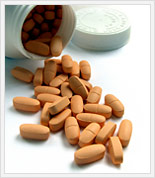 |
Already a member? Secure Login
|

- Ideal Weight Calculator
- Waist-to-Hip Ratio Calculator
- BMI Calculator
- Frame Size Calculator
- Target Heart Rate Calculator

- Good Fast Food
- Recipe Makeovers
- Meal Plans
- Nutrient Facts
- Food Label Claims
- Estimating Serving Sizes



Vitamin Supplements vs. Food
QUESTION:
I started MyFoodDiary.com to lose weight, but now I'm starting to focus on nutrients other than calories. Can I just take a daily vitamin pill and not worry so much about getting my vitamins and minerals from my foods?
I started MyFoodDiary.com to lose weight, but now I'm starting to focus on nutrients other than calories. Can I just take a daily vitamin pill and not worry so much about getting my vitamins and minerals from my foods?
ANSWER:
 I think it's wonderful that your focus has shifted from calories to nutrients. That is a true indication that your program is moving in the right direction. I believe that there are many reasons not to depend solely on vitamin pills for your nutrient intake. I've listed some of them below:
I think it's wonderful that your focus has shifted from calories to nutrients. That is a true indication that your program is moving in the right direction. I believe that there are many reasons not to depend solely on vitamin pills for your nutrient intake. I've listed some of them below:1. The dietary supplement industry is largely unregulated. Due to the Dietary Supplement Health and Education Act (DSHEA), the ability of the Food and Drug Administration (FDA) to regulate ingredients and claims made on dietary supplements has been greatly restricted. In other words, you never quite know what you're actually getting!
2. There are many beneficial food components that are difficult to "package" into a pill. One such food component is fiber.
3. Researchers have not yet identified all the biologically active components in food. Believe it or not there are hundreds if not thousands of various substances in foods, such as phytochemicals, that are advantageous. Therefore, you can never get the full benefit of "good food" into a pill!
4. Removing an active substance from food and successfully packaging it into a pill assumes that we know and fully understand the intricacies of that substance's properties - such as ideal concentrations, bioavailability under different circumstances, nutrient interactions with other compounds and medicines, chemical properties, and biological effects of these substances in vivo (in the body). Unfortunately, as of yet, we don't know all these things!
5. Extracts of substances from foods and "pill forms" are often different from the forms that occur naturally in foods, and we often don't know the effects that this may functionally play. In addition, active substances in foods naturally occur in a complex matrix of other nutrients and substances, and removing them from this natural environment may affect their function in ways that we don't fully understand.
6. Our bodies function in a delicate balance, with one action or nutrient often causing consequences in other areas. For example, excesses of one nutrient can affect the bioavailability and/or function of another nutrient or action. As stated by the ADA's position statement on Food Fortification and Dietary Supplements, "Consuming a wide variety of foods in moderate amounts reduces the risk of inadequate and excessive intakes."
Having given the above reasons for not depending on vitamin pills for your nutrient intake, there are circumstances in which proper supplementation can be helpful. For instance, a woman of child- bearing age may want to consider supplementing her diet with folate, iron and calcium if her diet is consistently lacking in these nutrients. Checking with your doctor or nutritionist is the best way to assess what nutrient supplementation may be advantageous to you individually. I typically recommend a low-to-moderate dose multi-vitamin as "extra insurance". However, it is important to remember that this should not (and cannot!) replace a healthy diet. Maybe at some point in the future, getting all the benefits of healthy food will be as easy as popping a pill. However, nutrition and biochemistry are relatively young fields and we're just not there yet. Besides, that would take away all the fun of good eating!
| Related Articles: |
 |
Our expert, Dr. Sharon E. Griffin, holds a B.S., M.S., and Ph.D. in the areas of exercise science/physiology. She also holds a second M.S. degree in Nutrition and is a licensed nutritionist and an ACSM certified health and fitness instructor.
© 2026 MyFoodDiary.com. All Rights Reserved.